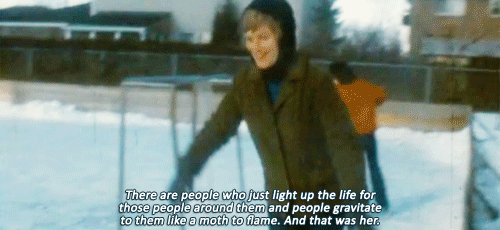Streaming on Amazon Prime.

Metadata: 2012 | PG-13 | 1h 49m
Genre: Documentary(-ish!)
Why I watched: Stories We Tell is a wonderful, unmissable film. I initially screened it in 2013, when it was released in the United States. (Director Sarah Polley is a Canadian filmmaker.) When I saw that it was leaving Prime on September 1, I rushed to rewatch it, and I am so, so glad that I did. Of course, this is well worth the $3.99 to rent, if you missed the window.
You might also like: Sarah Polley wrote the screenplay for Alias Grace (Netflix), based on Margaret Atwood's novel by the same name. This six-part miniseries follows an American doctor as he examines Grace Marks, a convicted murderer housed in Canada's Kingston Penitentiary. Atwood's Alias Grace—which is as much about storytelling as it is about anything else—was in part inspiration for Polley to make Stories We Tell. And in fact the opening lines of the documentary are quoted directly from Atwood's novel.

In this deeply personal, genre-mixing documentary, Oscar-nominated writer and director Sarah Polley shows us that the truth depends on who's telling it. Stories We Tell follows Sarah as she playfully interviews, interrogates, and films her family members, all of varying levels of reliability, as each tells the story of her late mother, Diane Polley. Shot both digitally and on Super 8 film, present-day recollections overlap re-enactments and footage from the past, giving us only glimpses of how things "really" were. The focus of her investigation? The relationship between her parents, Diane and Michael Polley, her mother's extramarital affair, and whether or not her father—whose narration underpins the film—is in fact her biological father.
Memories weave together to tell a complex story about marriage and love, parents and children. It's easy to forget that our parents' lives follow rich and unknown paths that we'll never fully understand. In this way, Sarah recovers what so few of us will be able to as she pieces together her mother's past. The feelings our parents felt. The struggles they overcame, and those they didn't. How we—their children—came to be, and how we almost didn't. It will make you want to call your relatives, close and distant, and ask them the same thing Sarah does at the start of the film: "Tell me everything, from the beginning."
The thing I love most about this film is the vulnerability of each family member. This is an intimate movie about how differing narratives shape and define us as individuals. It's also a documentary about the nature of documentary filmmaking, a genre that so often obscures emotion and artifice in order to appear objective. Stories We Tell goes in the entirely opposite direction, diving headfirst into affect and pulling the curtain back on the filmmaking process. In fact, it calls into question the idea that objectivity is even possible.
"The truth about the past is often ephemeral," Sarah says, "difficult to pin down." As Sarah unravels her own mythology, she doesn't reveal facts as much as she reveals the elusive nature of history and memory. We won't ever know the full story exactly as it happened. In the end, though, Stories We Tell depicts the Polley family in a way that captures its essence: brightly messy, absolutely complicated, and fiercely loving.
This is an enthralling, exquisitely layered film that tells a larger story about storytelling. I hope you enjoy it as much as I did.
Happy streaming! Liz
